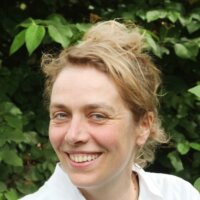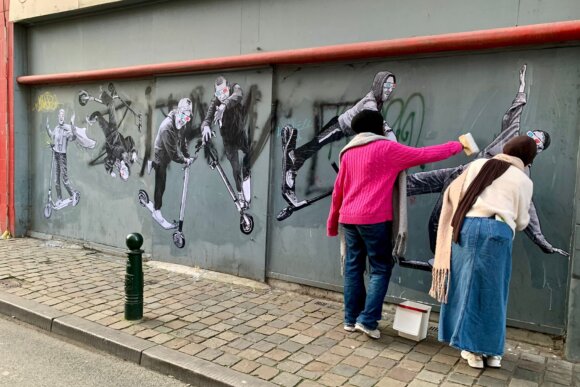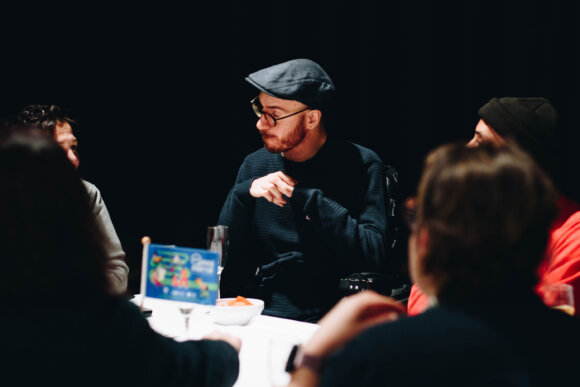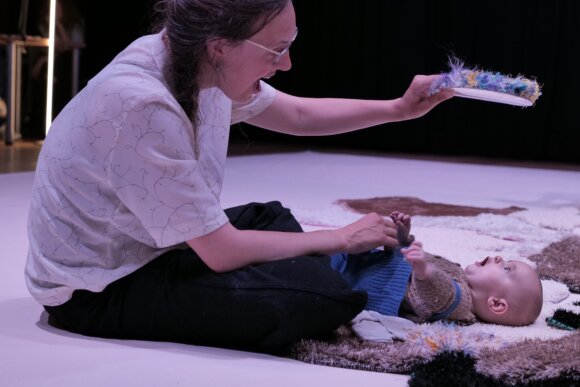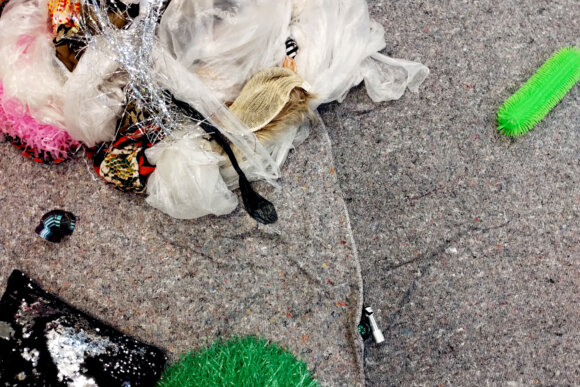
Walden Festival
Stephanie Lemmens
Lasso sent storyteller Stephanie to meet people committed to a more inclusive society. This led her to Walden, a festival that takes place every summer in and around Brussels' Leopold Park. For one weekend, Walden focuses on open-air performances and inclusivity, with a focus on people with disabilities. We asked Aurélie Walschaert and Esther De Soomer, communications coordinator and community projects & sustainability coordinator, how they make it work.
The hardware of a pop festival
The first edition of Walden Festival took place in 2021, in the midst of the Corona crisis. Since then, it has grown into a fully-fledged festival with a unique programme, format and audience. Aurélie explains: "Above all, it is an adventurous festival, where visitors can discover a wide range of genres and styles. You hear and see a beautiful mix of classical, jazz and many other musical traditions. Lots of concerts take place in the open air and last only forty minutes to an hour."
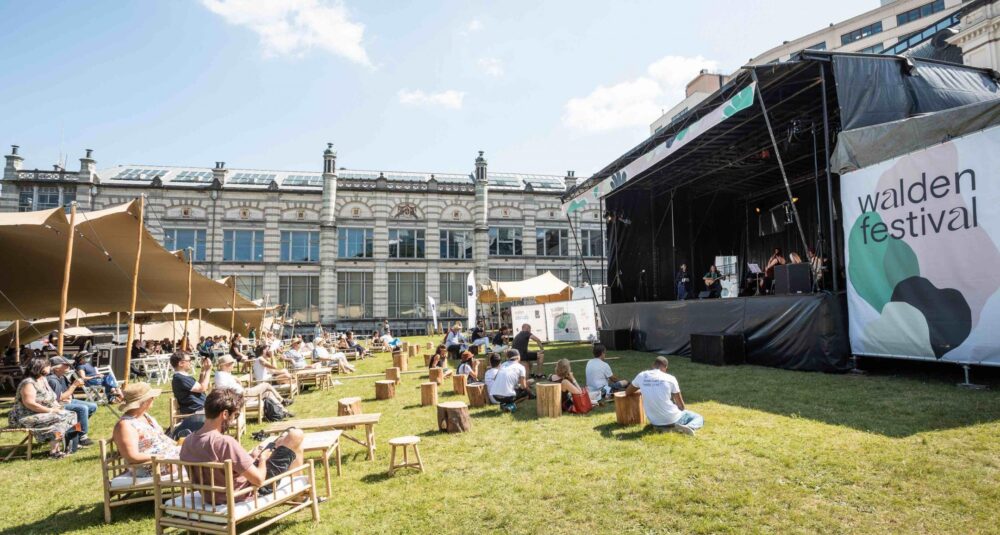
"Inclusivity has been an important focus from the outset," adds Esther. According to her, this also has to do with the specific format of the festival. "We have the hardware of a pop festival, but a completely different programme. A full evening concert at Bozar is a very different experience from entering a festival site, visiting different stages and getting a wristband. Because the concerts don’t take place in the infrastructure of partners, there is much more leeway to take matters into our own hands."
Small scale means that we can't implement all the measures, partly due to limited budgets. But thanks to that small scale, we can implement other things more easily.
- Esther De Soomer
Esther continues: "It also fits in seamlessly with the festival's focus on removing barriers, away from the 'codes' and 'norms' that often apply to classical concerts, such as when you can or can’t applaud, or what the dress code is." Aurélie: "We also see that the cultural sector in general is increasingly asking itself which people and groups are being forgotten or excluded. Because Walden is still such a young festival, it's easier for us to ride that wave. Throughout the different editions and years, we’ve been able to consolidate this more and more."
Accessibility as a reflex: from stage construction to communication
Two years ago, Esther and Aurélie approached Inter Vlaanderen, the Flemish expertise centre for accessibility. After getting to know the festival and visiting the venues, Inter provided all kinds of tips on how to make the festival more accessible. Esther: "That was very valuable, even though we noticed that Inter usually focuses on larger music festivals. We only reach between 1,200 and 1,500 people per day. This small scale also means that we cannot implement all measures, partly due to limited budgets. But thanks to this small scale, we can implement some things more easily."
If spaces are not accessible or difficult to access, it is our job to communicate this clearly.
- Aurélie Walschaert
Since then, inclusion has become a reflex in everything Esther and Aurélie do. "We also try to involve the whole team in this, because inclusion has implications at all levels: in setting up the festival, in the practical organisation, in communication, in ticket sales..." According to Esther, the location of the festival is often a stumbling block: "The terrain is hilly, bumpy and scattered with pebbles. Last year, we rotated the stage by 90 degrees, which meant we also had to adjust the tent and passageways. We asked the set builders to create a path for wheelchair users, but due to the layout, the passageway was not wide enough for wheelchairs to cross or turn." This means that Aurélie and Esther have to be very specific in the instructions and measurements they give to the stage builders, and they have to do this over and over again. Esther: "At moments like these, we realise that our world is still not sufficiently adapted to people with disabilities."
Communication is crucial. Internally, between partners, but also towards the public. Aurélie: "Good communication is an essential part of accessibility. If spaces are not accessible or are more difficult to access, it’s our job to communicate this clearly. We do this through our website and personal contact, among other things. We also ask people to contact us if they can’t find something or if they have a specific need." Esther agrees on the importance of good communication: "People with disabilities are often overlooked. Being aware of this is one thing, but by communicating clearly about it, we show that we care. This is often even more important than the concrete measures we take."
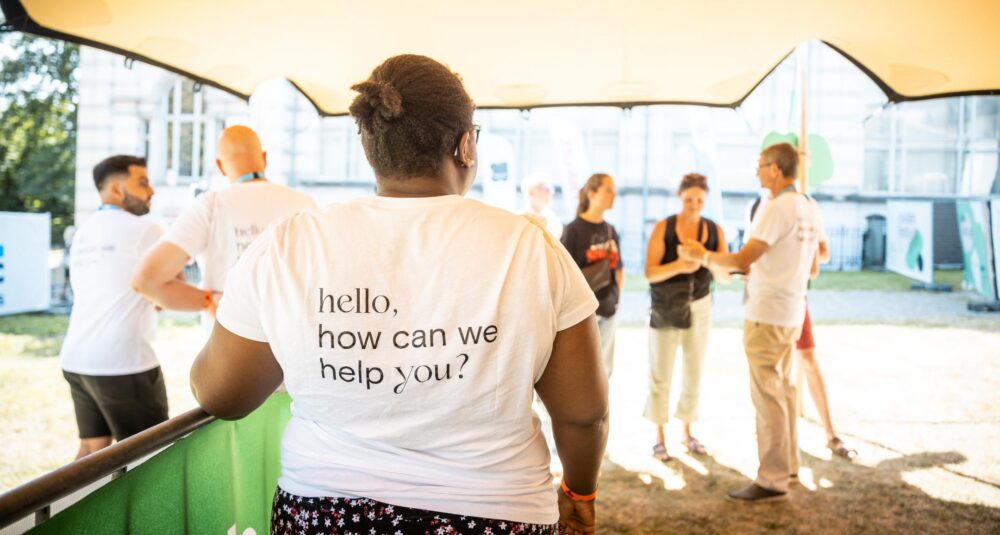
Above all, the team behind Walden Festival is strongly committed to direct human contact. Esther: "We train volunteers and student workers to help people. This works very well and we see that employees are always willing to help spontaneously, even when they already have a lot on their plate." People with disabilities are also regularly asked for their opinions. Aurélie: "At the festival itself, we talk to people and ask them about their experiences, what went well and what could be improved." Aurélie and Esther also see certain people with disabilities returning, which makes it possible to build a relationship and ask specific questions. Aurélie: "The team has already received a lot of positive feedback, which motivates us to do even more."
Inclusive for everyone?
With each new edition, Aurélie and Esther evaluate the needs, possibilities and feasibility of certain interventions. Aurélie: "We try to keep an open mind about the barriers people encounter. At the same time, we are inspired by how other festivals tackle this issue."
Some things are not feasible on a budget, such as an induction loop that dampens stimuli for deaf and hard-of-hearing people. Esther: "We even consulted an expert in the area about providing a special transmitter, but that also proved too expensive." Other things are not possible due to time constraints. Aurélie: "Two editions ago, people were able to prepare for the festival and the site through a visual story. This story is very detailed and contains many photos. As soon as something changes, it has to be updated, and unfortunately we didn't have time for that last edition."
Even though the steps we take are small, we want to show that we care about the people who come to the festival.
- Esther De Soomer
For some groups, adjustments can be made easily. Aurélie: "Companions of people with visual impairments, as well as guide dogs, are welcome at the festival. One companion can attend for free." "And we always provide an extra bowl of water for the dogs," Esther adds with a smile. Aurélie: "We are also working on the 'visual' accessibility of our website and hope to obtain the AnySurfer label in the future." The festival does not focus equally on every disability, but according to Esther, this is not necessary: "Because it is a slow festival, focused on peace and enjoyment in the countryside, we do not feel the need for separate low-stimulus areas. Even though some concerts are a bit more upbeat, there is always a place in the park where you can retreat."
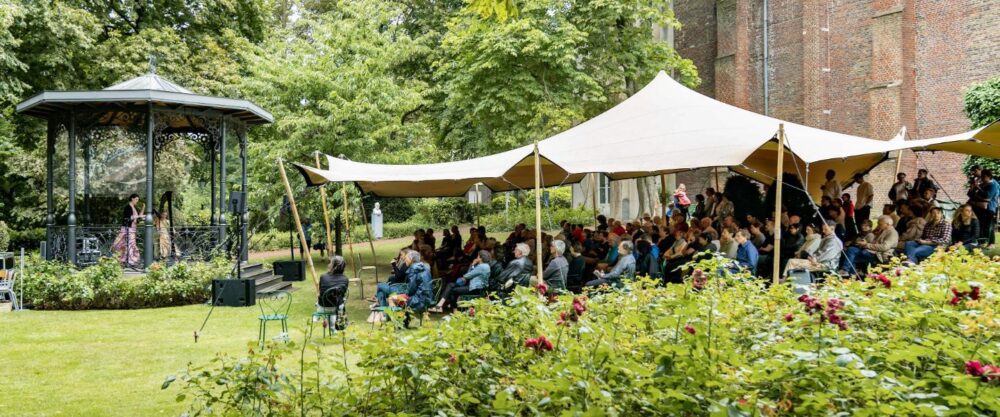
Caring through collaboration and awareness
An important step in working on inclusivity is collaboration with partner organisations. Aurélie and Esther enthusiastically talk about 'Jouw Sleutel' (Your Key), a project in which people encountering barriers to experience culture are invited through social organisations. They already worked with organisations for people in situations of poverty, the Brussels Elderly Platform and Hubbie, an organisation for people with mental disabilities. Esther: "This allows us to reach specific groups in a very targeted way." Esther and Aurélie learn valuable lessons from each collaboration. Esther: "We once organised workshops on making sounds with balloons for people with hearing impairments, but it proved too difficult to find participants because the organisations' schedules were already full. We won't hit that wall again anytime soon."
Esther and Aurélie also try to raise awareness of inclusivity among their partners: the owners of the venues, the stage builders, the people at the bar and in the food trucks, etc. For example, food truck operators are asked to address people at eye level, people with disabilities can park on the festival grounds ( ) and, despite the general ban in the bar, straws are provided for people who have difficulty swallowing.
'Caring' is high on the agenda for the Walden Festival team. Esther: "Even though the steps we are taking are small, we want to show that we care about the people who come to the festival. This care is reflected in many areas: the direct contact with the audience, how the festival site is designed, the way we put together the programme, the locations we select and the way we communicate."
Foto's © Focus Knack, Walden Festival

